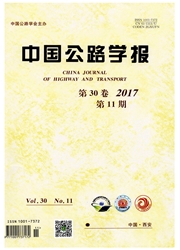

 中文摘要:
中文摘要:
为提高第三方物流及其分包商之间服务创新收益共享机制的有效性,考虑分包商具有过度自信的心理特征并引入客户监督机制,建立委托代理模型,将求解得到的分包商最优收益共享系数和最优努力水平与未考虑分包商过度自信和没有客户监督时的状况进行比较,分析了分包商过度自信及引入客户监督机制时对分包商收益共享系数、创新努力水平及创新主体的总收益和代理成本的影响,在此基础上进行了数值分析和应用举例。研究结果表明:选择过度自信的分包商及引入客户监督机制在一定范围内均可提高分包商的收益共享系数和创新努力水平,提高总收益并降低代理成本,且二者具有替代作用;选择过度自信的分包商和引入客户监督的物流服务创新机制是有效的。
 英文摘要:
英文摘要:
To improve the validity of service innovation revenue sharing mechanism between the third party logistics and its subcontractors, considering subcontractor overconfident psychological characteristic, and introducing customer supervision mechanism, principal-agent model was established. The obtained subcontractor's optimal revenue sharing coefficient and the optimal effort level were compared with those without considering the subcontractor overconfidence and customer supervision. The influences of subcontractor overconfidence and customer supervision on the subcontractor revenue sharing coefficient, innovation effort, the total revenue of innovation subject and innovation agency cost were analyzed, which were illustrated with numerical analysis and application. The results show that selecting the overconfident subcontractors and introducing the customer supervision mechanism can improve subcontractor revenue sharing coefficient and innovation effort level, increase the total revenue and reduce agency cost in a certain range, and both play a replaceable role. The logistics service innovation mechanism which selects the overconfident subcontractor and introduces customer satisfaction supervision is effective.
 同期刊论文项目
同期刊论文项目
 同项目期刊论文
同项目期刊论文
 Coordination of outsourced operations at a third-party facility subject to booking, overtime, and ta
Coordination of outsourced operations at a third-party facility subject to booking, overtime, and ta Optimal policies in hybrid manufacturing/remanufacturing systems with random price-sensitive product
Optimal policies in hybrid manufacturing/remanufacturing systems with random price-sensitive product Forecast and Rolling Horizons under Demand Substitution and Production Changeovers Analysis and Insi
Forecast and Rolling Horizons under Demand Substitution and Production Changeovers Analysis and Insi On consensus of group decision making with interval utility values and interval perference orderings
On consensus of group decision making with interval utility values and interval perference orderings A tabu search algorithm with solution space partition and repairing procedure for cyclic robotic cel
A tabu search algorithm with solution space partition and repairing procedure for cyclic robotic cel Social responsibility allocation in two-echelon supply chains: Insights from wholesale price contrac
Social responsibility allocation in two-echelon supply chains: Insights from wholesale price contrac Optimal acquisition and production policy in a hybird manufacturing/remanufacturing system with core
Optimal acquisition and production policy in a hybird manufacturing/remanufacturing system with core Optimal Manpower Planning Decision with Single Employee Type Considering Minimal Employment Period C
Optimal Manpower Planning Decision with Single Employee Type Considering Minimal Employment Period C Optimal Solution Structure for Multi-period Prodution Planning with Returned Products Remanufacturin
Optimal Solution Structure for Multi-period Prodution Planning with Returned Products Remanufacturin 期刊信息
期刊信息
